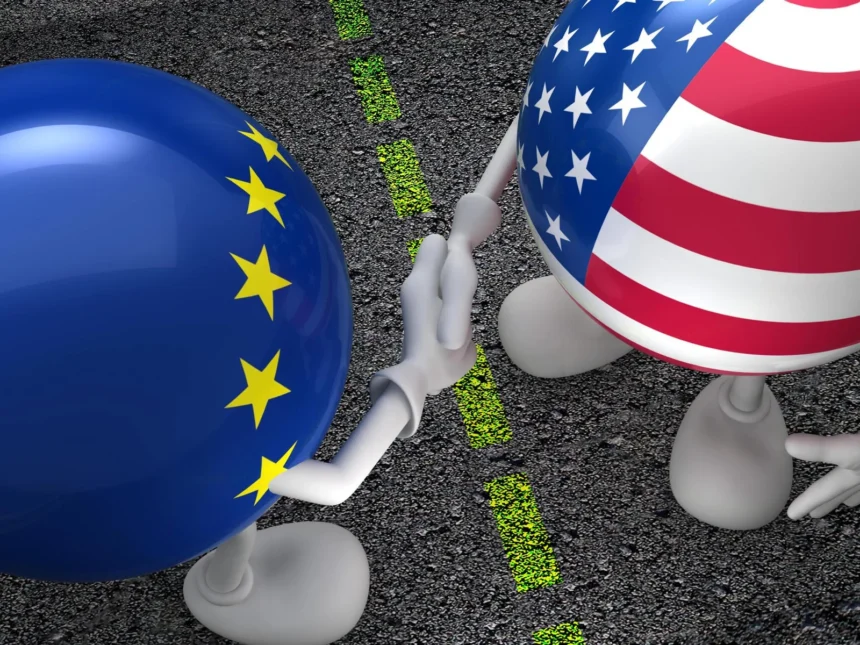Navigating the complex landscape of foreign policy can feel like a journey through an intricate maze, with each turn revealing new challenges and opportunities. From the fluctuating prices we notice at our local markets to the seemingly abstract diplomatic alliances shaping our world order, these shifts touch our lives in tangible ways.
Trade and diplomacy serve as the linchpins that hold together the fabric of international relations. They’re not just terms tucked away in political science textbooks; they are alive, pulsing through the veins of global interaction every day.
Through this article, I aim to peel back layers of complexity surrounding shifts in foreign policy and their profound impacts on trade practices and diplomatic endeavors, offering clear insights into how these elements influence global camaraderie.
With a career spent demystifying global trends for those who seek understanding, my goal is to guide you through these intricacies with ease. Let’s embark on this exploration together, shedding light on how nations navigate their place on the world stage.
This promises not just clarity but perhaps a newfound appreciation for how interconnected our world truly is.
Key Takeaways
- Foreign policy changes can lead to new trade rules and affect how countries work together. For example, after September 11, the U.S. focused more on security, which changed some trade agreements.
- Economic diplomacy is vital for building strong ties between countries. It uses economic tools to help a country’s international goals. The U.S., with its big economy and political power, plays a big role in shaping global trade and relationships through its foreign policies.
- Trade agreements can change because of shifts in foreign policy. This happened during the US-China trade tensions when both countries altered their trade practices, affecting businesses and consumers.
- American foreign policy has a huge impact worldwide because of the country’s economic and diplomatic strength. Changes in American policy can influence international relations, including who trades with whom.
- Understanding how foreign policies impact diplomacy and trade helps policymakers make better decisions that benefit their countries’ global standing and economy.
Understanding Foreign Policy Shifts
Understanding Foreign Policy Shifts refers to the changes in a country’s approach towards international affairs, including its diplomatic relations and trade agreements. These shifts have historical precedents, such as following September 11 and China’s economic slowdown, highlighting their impact on global trade and diplomacy.
Definition and importance
Foreign policy shifts are changes in how a country deals with other countries. These changes can affect trade, alliances, and how countries work together. The U.S. Department of State uses foreign policy to talk to other countries.
This is important because it helps maintain peace and security around the world.
These shifts also play a big role in globalization and economic diplomacy. They influence trade agreements and relationships between countries. Since the U.S. has strong diplomatic and economic power, its foreign policies heavily impact global trade and international relations.
Historical examples (September 11, China’s economic slowdown)
The September 11 attacks led to a significant shift in U.S. foreign policy, focusing on counterterrorism efforts and global security. Trade relationships were impacted as the nation prioritized security measures over certain economic agreements.
China’s economic slowdown also altered international trade dynamics, affecting global markets due to reduced demand and supply chain disruptions. As policymakers, recognizing these fundamental changes is crucial for addressing them through diplomatic, economic, and military resources.
Moving forward – Economic Diplomacy and Trade Relationships
Impact on trade and Diplomacy
Foreign policy shifts have a significant impact on trade and diplomacy, shaping the economic and diplomatic relationships between countries. Geopolitical changes can lead to alterations in international trade policies and influence foreign governments through open economy strategies.
As seen in US-China trade tensions, these shifts affect not only bilateral relations but also global trade dynamics, thus underscoring the intricate linkages between diplomacy and economic influence.
The evolving landscape of international affairs calls for meticulous observation of how foreign policy shapes trade agreements and geopolitical negotiations.
Economic diplomacy plays a crucial role in advancing a country’s interests on the global stage. It underpins efforts to navigate the complexities of international trade policy by tailoring strategies toward bolstering diplomatic relations through economic means.
As such, American foreign policy holds particular significance due to its ability to foster or impede economic ties with other nations while shaping broader international relations.
ALSO READ: In-Depth Analysis: Climate Change Policies and Global Response(Opens in a new browser tab)
Economic Diplomacy and Trade Relationships
Foreign policy shifts have a significant impact on economic diplomacy and trade relationships. They influence how countries engage in trade agreements and navigate open economies, ultimately affecting their diplomatic ties with other nations.
The role of economic diplomacy in foreign policy
Economic diplomacy plays a crucial role in shaping foreign policy. It involves using economic tools to advance national interests and promote international trade relationships. By leveraging trade negotiations and open economy policies, countries can influence other nations economically while strengthening diplomatic ties.
This underpins the significance of economic diplomacy in navigating the complexities of international affairs and is tailored toward enhancing global economic influence.
Moreover, American foreign policy stands as an example highlighting the impact of economic diplomacy on a global scale. The U.S.’s political and economic influence on foreign countries demonstrates the importance of utilizing economic tools to shape international relations, emphasizing how foreign policy is intertwined with trade negotiations and geopolitical shifts.
How trade agreements are affected by foreign policy shifts
Foreign policy shifts greatly impact trade agreements, shaping the economic relationships between countries. For instance, the US-China trade tensions led to significant alterations in trade patterns and tariffs.
These changes directly affected consumers and producers in both countries, leading to reduced trade levels between them. Similarly, foreign policy adjustments can lead to renegotiation or even withdrawal from existing trade pacts such as free trade agreements or customs unions.
It’s pivotal for policymakers to carefully consider the implications of foreign policy shifts on international commerce and work towards fostering mutually beneficial trading environments.
The influence of foreign policy on global trade dynamics cannot be overstated. The interdependence between economic policies and diplomatic strategies underscores the need for policymakers to navigate these complexities meticulously.
Recognizing that every shift in foreign policy has a direct impact on international economic relations is vital for devising effective strategies in navigating the ever-evolving realm of global commerce.
Influence on foreign countries through open economy and trade policies
Shifting foreign policies affects how we engage in trade with other countries, impacting their economies and diplomatic ties. Open economy and trade policies play a crucial role in influencing foreign nations and shaping global economic interactions.
American foreign policy has historically showcased the impact and importance of these relationships, demonstrating the significance of diplomacy and trade on an international scale.
Additionally, US-China trade tensions have shown how shifts in open economy policies can directly affect producers and consumers across borders.
The evolution of open economy and trade policies underpins our influence on foreign countries economically and politically. These interconnected relationships are vital components of international affairs, as demonstrated by the intricate web of diplomacy that supports them.
Diplomacy and Geopolitical Shifts
Geopolitical shifts significantly impact diplomatic relationships and international dynamics. To understand more, read the full blog.
Changes in international diplomacy through foreign policy shifts
International diplomacy undergoes seismic shifts due to foreign policy adjustments. These changes reverberate across the globe, reshaping diplomatic relationships. As these shifts unfold, they significantly impact how nations interact and collaborate on political and economic fronts.
The intricate web of global diplomacy is constantly being rewoven through these policy adjustments, shaping new alliances and altering existing ones in ways that ripple through international relations.
Foreign policy evokes a domino effect of change. It sets off a chain reaction that alters the dynamics of global interactions, leading to recalibrations in diplomatic strategies. This creates an environment where countries engage with one another differently as they navigate the new terrain shaped by foreign policy shifts.
These alterations prompt a redrawing of geopolitical landscapes worldwide as countries pivot their stances to meet evolving international dynamics, forging fresh alliances or redefining previous partnerships.
Implications on diplomatic relationships with other countries
Moving from the changes in international diplomacy through foreign policy shifts, it is crucial to recognize how these shifts can significantly impact diplomatic relationships with other countries.
The United States’ deployment of military, economic resources, and cultural diplomacy has shaped its interactions with foreign nations. Through trade agreements and cultural exchanges, diplomatic ties have been strengthened or strained based on foreign policy decisions – a clear testament to the intertwined nature of trade and diplomacy.
As American policymakers navigate fundamental changes in world politics, recognizing the spectrum of areas that encompass foreign policy becomes imperative. Cultural diplomacy plays a pivotal role in shaping international perceptions and fostering collaboration.
The Role of American Foreign Policy
The United States wields significant economic and diplomatic power globally. Foreign policy shifts have a direct impact on international relations, trade, and economic influence. To delve deeper into this crucial aspect of global affairs, read more.
The United States economic and diplomatic power
American foreign policy has a significant impact on global trade and international relations. The U.S. Department of State plays a crucial role in conveying policies to other nations.
Trade and foreign policy are closely intertwined, with diplomacy being the key tool for shaping foreign policy interests. We recognize that cultural diplomacy shapes how countries are viewed internationally, fostering goodwill and collaboration.
The U.S.’s influence politically and economically demonstrates the significance of its foreign policy in international affairs. Our economic and diplomatic power impacts countries worldwide, emphasizing the pivotal role of American influence on global trade and diplomacy.
How foreign policy shifts affect global trade and economic influence
Foreign policy shifts have a significant impact on global trade and economic influence. When foreign policies change, it alter how countries engage in trade and impacts the economic relationships between nations.
The United States’ diplomatic and economic power shapes international relations, influencing global trade dynamics. Additionally, U.S.-China trade tensions have demonstrated how foreign policy can directly affect consumer markets and business operations in both countries, leading to a reduction in trade activities.
The role of American foreign policy is crucial, not only politically but also economically. America’s influence on other countries showcases the significance of foreign policy in shaping international affairs.
This influence extends into areas such as defense, development, international economics, and other key policies that underpin the ever-changing world of diplomacy and trade relations.
The impact of American foreign policy on international relations
The impact of American foreign policy on international relations is profound and far-reaching. As the United States holds significant political and economic sway globally, its foreign policy decisions reverberate across nations.
The U.S. Department of State plays a pivotal role in representing American policies to foreign governments and international organizations through embassies and consulates, shaping diplomatic ties with countries worldwide.
American foreign policy has been marked by an intricate web of military interventions, economic aid packages, trade agreements, and strategic alliances that influence international relations.
These actions have demonstrated the capacity of the U.S. to exert political and economic influence on other countries, showcasing the significance of foreign policy in global affairs.
Economically, America’s approach to tariffs, sanctions, or investment incentives can significantly affect how other nations engage in trade partnerships with each other as well as shape their diplomatic relationships with the United States.
Conclusion
Foreign policy shifts play a pivotal role in shaping international trade and diplomacy. Their implications touch every corner of global interactions, affecting everything from economic conditions to geopolitical alliances.
Dr. Emily Hargrove, a leading expert in foreign affairs with over two decades of experience, offers invaluable insights into the complexities of these shifts. Holding a Ph.D. in International Relations from Stanford University and having worked as an advisor to multiple governmental bodies on foreign strategy, her analysis brings clarity to this multifaceted issue.
Dr. Hargrove emphasizes that changes in foreign policy directly impact trade agreements and diplomatic relations worldwide. She points out historical examples like the events following September 11 and China’s economic slowdown to illustrate how such shifts can influence global markets and political ties.
Her expertise underlines the significance of understanding the mechanisms behind these changes for effective policy-making.
ALSO READ: CBN removes limit on PAPSS payment services(Opens in a new browser tab)
Discussing safety, ethics, and transparency within foreign policy adjustments is crucial, according to Dr. Hargrove. She highlights the importance of compliance with international regulations and advocates for open communication between nations as imperative steps toward sustainable global relations.
Incorporating strategies that adapt well to foreign policy fluctuations into daily governance or policymaking is another area where Dr. Hargrove lends her expertise. She suggests regular reviews of trade policies and diplomatic approaches to ensure they remain beneficial despite changing international landscapes.
While acknowledging benefits like strengthened alliances through strategic diplomacy or improved economy via adept handling of trade relationships, Dr.Hargove also addresses potential downsides—for instance, short-term disruptions in markets or temporary strains on diplomatic relations as policies adjust.
Ultimately, Dr.Hargove reinforces the value of flexibility and informed decision-making when navigating through foreign policy shifts‘ impacts on trade and diplomacy saying their proper management holds key advantages for national interests globally.
FAQs
1. What are foreign policy shifts?
Foreign policy shifts are changes in how a country deals with other countries, affecting trade and diplomacy.
2. How do these shifts impact trade?
When a country changes its foreign policy, it can affect who it trades with and what goods it exchanges, impacting economic policies.
3. Can foreign policy shifts change relationships between countries?
Yes, when a country changes its approach to foreign affairs, it can either improve or worsen relationships with other nations.
4. Why is understanding foreign policy shifts important?
Understanding these shifts helps people know how countries will interact on the global stage and predict future economic and diplomatic relations.









